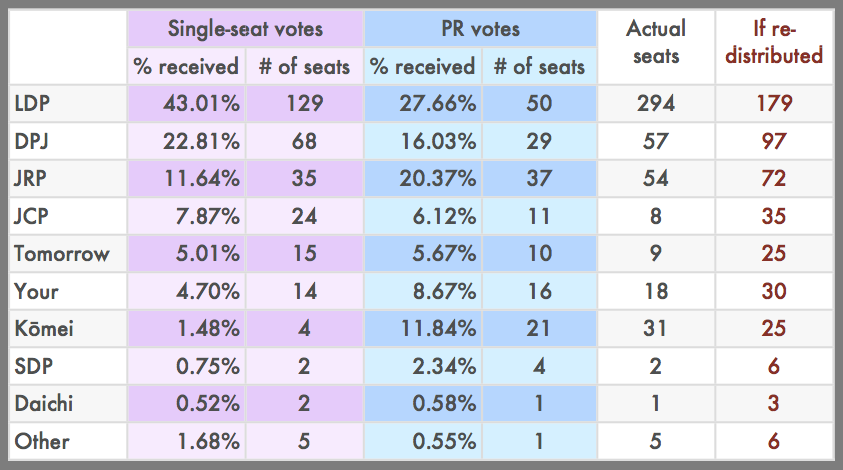Strong majority, weak support?
Politics- English
- 日本語
- 简体字
- 繁體字
- Français
- Español
- العربية
- Русский
The dust has settled from last Sunday's general election, which put the Liberal Democratic Party back in power with a convincing majority of 294 seats in the 480-seat lower house of the Diet. Together with coalition partner New Kōmeitō (31 seats), the LDP commands a two-thirds majority in the chamber—enough to power through even legislation that is rejected by the upper house.
Widely noted, though, is the fact that the LDP did not fare so well in the actual voting. On the Sigma1 blog, Corey Wallace notes that in the proportional representation contest, where voters select a party in addition to the vote they cast for an individual representative in their electoral district, the LDP won a national average of just 27.6% of the votes (27.66% in the table below). This is less than a percentage point higher than the 26.7% of the PR vote it received in 2009, when it was drubbed by the Democratic Party of Japan, taking a total of just 119 seats that year to the DPJ's 308.
It all adds up to a mismatch between popular support for the party and the election outcome. As Michael Cucek, another blogger covering Japanese politics, points out here, “the electoral system is designed to deliver victory to the Liberal Democratic Party even if the LDP is massively unpopular.”
One interesting table making the Internet rounds today comes from this Tuesday blog entry. See it below translated into English. “Actual seats” are what the parties hold after Sunday's election; the other seat number figures show what they would have received if the seats were allotted by the popular vote across the board. In this model, the LDP-Kōmeitō coalition ends up with just 204 seats—not even a majority—while the DPJ holds on to 40 more seats than it actually has today. Other winners in this alternate Japan include the Japanese Communist Party, with more than four times as many seats as it actually won, as well as “third force” parties like the Japan Restoration Party (up to 72 from 54), the Your Party (up to 30 from 18), and the Tomorrow Party of Japan (up to 25 from 9).
 The startling gap between votes received and Diet seats won
The startling gap between votes received and Diet seats won
This is all intellectual exercise, though. The LDP and Kōmeitō are in comfortable control of the lower house. High-profile LDP members including Secretary-General Ishiba Shigeru are saying the right things in TV interviews, noting that this contest was one that the DPJ lost, not that their party won. It remains to be seen, though, whether this recognition of the shaky popular support for their party will translate into a more cautious approach to policy.
LDP politics Diet election DPJ Lower House House of Representatives